Employment Law Homework Assignment - Analysis of Cases
VerifiedAdded on 2022/07/29
|5
|977
|233
Homework Assignment
AI Summary
This document presents a comprehensive analysis of an Employment Law assignment, addressing various scenarios and legal concepts. The assignment explores topics such as employer liability for employee actions, calculation of damages in wrongful dismissal cases, the rights of employers to restructure organizations, and the remedies available for unfair dismissal. The solutions provided analyze specific cases, considering factors like justifiable grounds for dismissal, employee reinstatement, and the legal implications of contract breaches. Furthermore, the document examines the roles of human rights tribunals in resolving labor disputes and the defenses available to both employers and employees in employment-related legal actions, referencing relevant legal precedents and academic sources to support its arguments. This assignment provides a practical understanding of employment law principles.
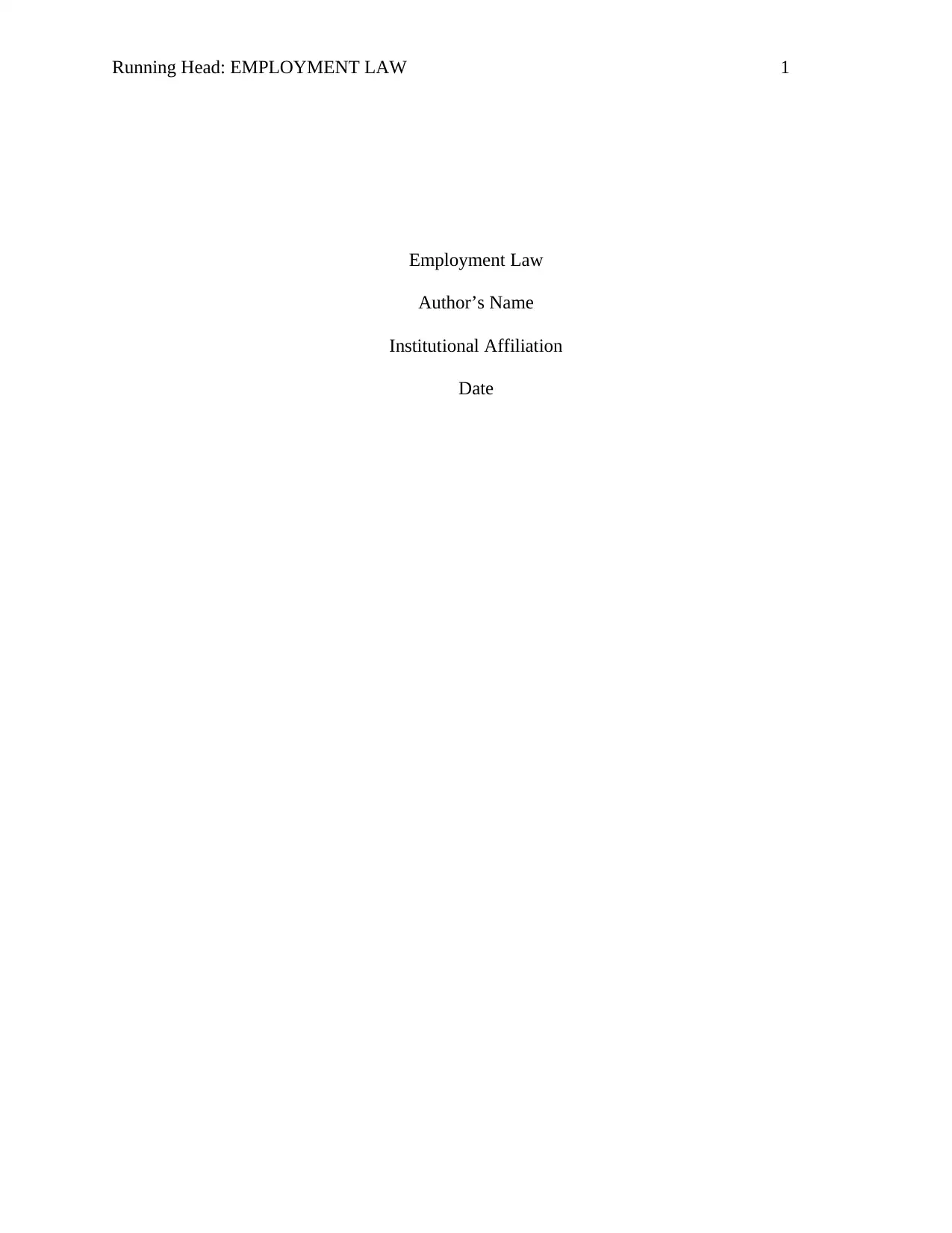
Running Head: EMPLOYMENT LAW 1
Employment Law
Author’s Name
Institutional Affiliation
Date
Employment Law
Author’s Name
Institutional Affiliation
Date
Paraphrase This Document
Need a fresh take? Get an instant paraphrase of this document with our AI Paraphraser
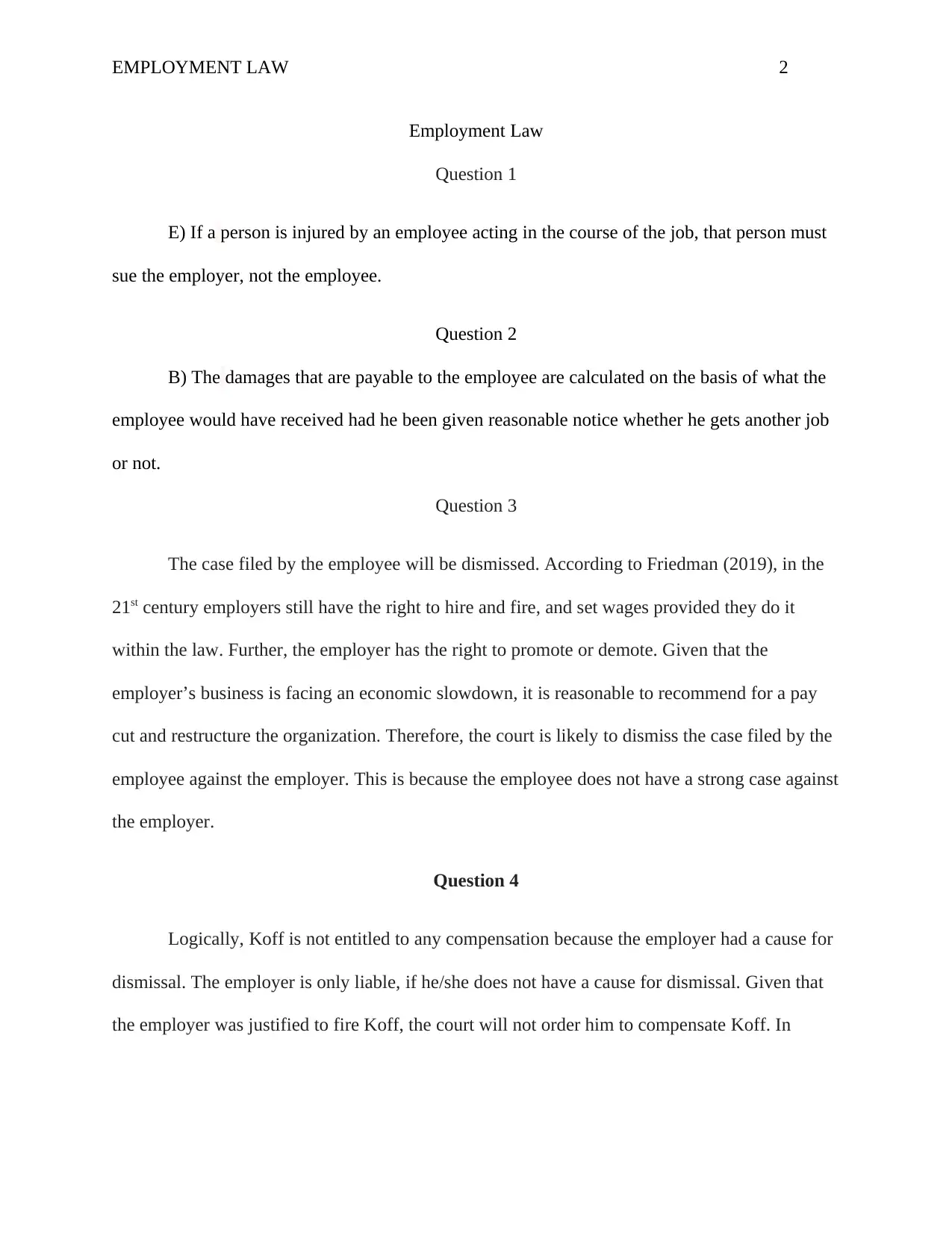
EMPLOYMENT LAW 2
Employment Law
Question 1
E) If a person is injured by an employee acting in the course of the job, that person must
sue the employer, not the employee.
Question 2
B) The damages that are payable to the employee are calculated on the basis of what the
employee would have received had he been given reasonable notice whether he gets another job
or not.
Question 3
The case filed by the employee will be dismissed. According to Friedman (2019), in the
21st century employers still have the right to hire and fire, and set wages provided they do it
within the law. Further, the employer has the right to promote or demote. Given that the
employer’s business is facing an economic slowdown, it is reasonable to recommend for a pay
cut and restructure the organization. Therefore, the court is likely to dismiss the case filed by the
employee against the employer. This is because the employee does not have a strong case against
the employer.
Question 4
Logically, Koff is not entitled to any compensation because the employer had a cause for
dismissal. The employer is only liable, if he/she does not have a cause for dismissal. Given that
the employer was justified to fire Koff, the court will not order him to compensate Koff. In
Employment Law
Question 1
E) If a person is injured by an employee acting in the course of the job, that person must
sue the employer, not the employee.
Question 2
B) The damages that are payable to the employee are calculated on the basis of what the
employee would have received had he been given reasonable notice whether he gets another job
or not.
Question 3
The case filed by the employee will be dismissed. According to Friedman (2019), in the
21st century employers still have the right to hire and fire, and set wages provided they do it
within the law. Further, the employer has the right to promote or demote. Given that the
employer’s business is facing an economic slowdown, it is reasonable to recommend for a pay
cut and restructure the organization. Therefore, the court is likely to dismiss the case filed by the
employee against the employer. This is because the employee does not have a strong case against
the employer.
Question 4
Logically, Koff is not entitled to any compensation because the employer had a cause for
dismissal. The employer is only liable, if he/she does not have a cause for dismissal. Given that
the employer was justified to fire Koff, the court will not order him to compensate Koff. In
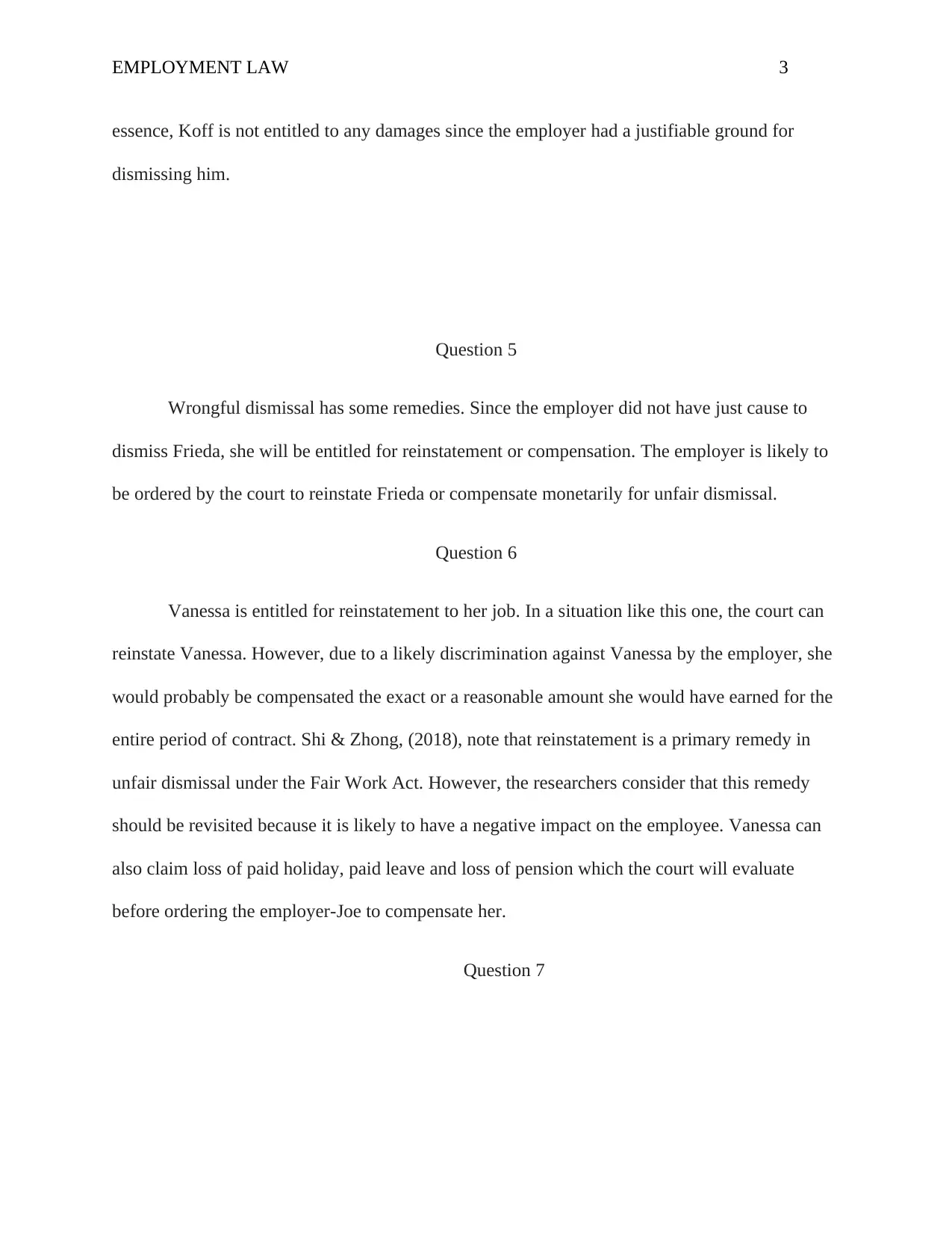
EMPLOYMENT LAW 3
essence, Koff is not entitled to any damages since the employer had a justifiable ground for
dismissing him.
Question 5
Wrongful dismissal has some remedies. Since the employer did not have just cause to
dismiss Frieda, she will be entitled for reinstatement or compensation. The employer is likely to
be ordered by the court to reinstate Frieda or compensate monetarily for unfair dismissal.
Question 6
Vanessa is entitled for reinstatement to her job. In a situation like this one, the court can
reinstate Vanessa. However, due to a likely discrimination against Vanessa by the employer, she
would probably be compensated the exact or a reasonable amount she would have earned for the
entire period of contract. Shi & Zhong, (2018), note that reinstatement is a primary remedy in
unfair dismissal under the Fair Work Act. However, the researchers consider that this remedy
should be revisited because it is likely to have a negative impact on the employee. Vanessa can
also claim loss of paid holiday, paid leave and loss of pension which the court will evaluate
before ordering the employer-Joe to compensate her.
Question 7
essence, Koff is not entitled to any damages since the employer had a justifiable ground for
dismissing him.
Question 5
Wrongful dismissal has some remedies. Since the employer did not have just cause to
dismiss Frieda, she will be entitled for reinstatement or compensation. The employer is likely to
be ordered by the court to reinstate Frieda or compensate monetarily for unfair dismissal.
Question 6
Vanessa is entitled for reinstatement to her job. In a situation like this one, the court can
reinstate Vanessa. However, due to a likely discrimination against Vanessa by the employer, she
would probably be compensated the exact or a reasonable amount she would have earned for the
entire period of contract. Shi & Zhong, (2018), note that reinstatement is a primary remedy in
unfair dismissal under the Fair Work Act. However, the researchers consider that this remedy
should be revisited because it is likely to have a negative impact on the employee. Vanessa can
also claim loss of paid holiday, paid leave and loss of pension which the court will evaluate
before ordering the employer-Joe to compensate her.
Question 7
⊘ This is a preview!⊘
Do you want full access?
Subscribe today to unlock all pages.

Trusted by 1+ million students worldwide
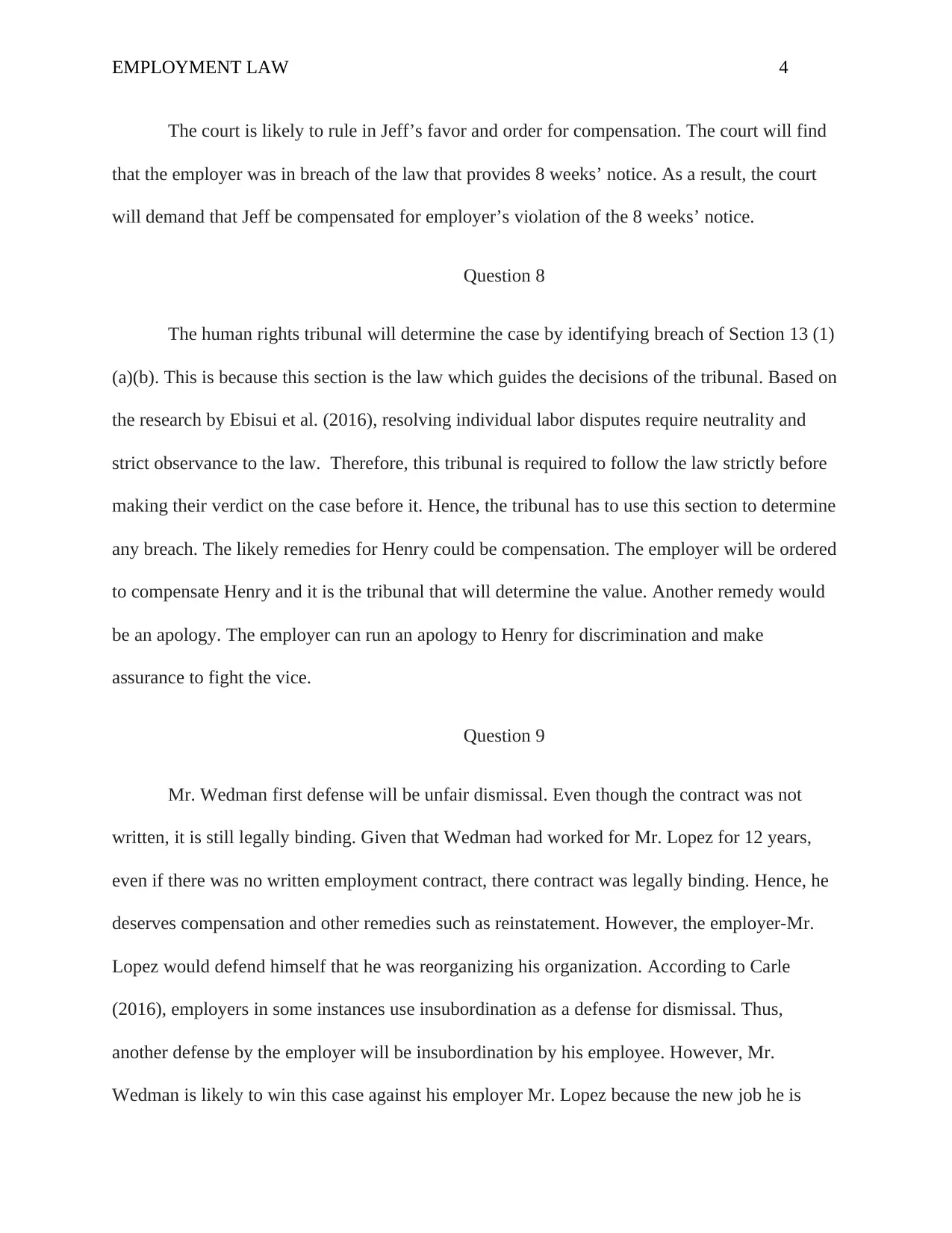
EMPLOYMENT LAW 4
The court is likely to rule in Jeff’s favor and order for compensation. The court will find
that the employer was in breach of the law that provides 8 weeks’ notice. As a result, the court
will demand that Jeff be compensated for employer’s violation of the 8 weeks’ notice.
Question 8
The human rights tribunal will determine the case by identifying breach of Section 13 (1)
(a)(b). This is because this section is the law which guides the decisions of the tribunal. Based on
the research by Ebisui et al. (2016), resolving individual labor disputes require neutrality and
strict observance to the law. Therefore, this tribunal is required to follow the law strictly before
making their verdict on the case before it. Hence, the tribunal has to use this section to determine
any breach. The likely remedies for Henry could be compensation. The employer will be ordered
to compensate Henry and it is the tribunal that will determine the value. Another remedy would
be an apology. The employer can run an apology to Henry for discrimination and make
assurance to fight the vice.
Question 9
Mr. Wedman first defense will be unfair dismissal. Even though the contract was not
written, it is still legally binding. Given that Wedman had worked for Mr. Lopez for 12 years,
even if there was no written employment contract, there contract was legally binding. Hence, he
deserves compensation and other remedies such as reinstatement. However, the employer-Mr.
Lopez would defend himself that he was reorganizing his organization. According to Carle
(2016), employers in some instances use insubordination as a defense for dismissal. Thus,
another defense by the employer will be insubordination by his employee. However, Mr.
Wedman is likely to win this case against his employer Mr. Lopez because the new job he is
The court is likely to rule in Jeff’s favor and order for compensation. The court will find
that the employer was in breach of the law that provides 8 weeks’ notice. As a result, the court
will demand that Jeff be compensated for employer’s violation of the 8 weeks’ notice.
Question 8
The human rights tribunal will determine the case by identifying breach of Section 13 (1)
(a)(b). This is because this section is the law which guides the decisions of the tribunal. Based on
the research by Ebisui et al. (2016), resolving individual labor disputes require neutrality and
strict observance to the law. Therefore, this tribunal is required to follow the law strictly before
making their verdict on the case before it. Hence, the tribunal has to use this section to determine
any breach. The likely remedies for Henry could be compensation. The employer will be ordered
to compensate Henry and it is the tribunal that will determine the value. Another remedy would
be an apology. The employer can run an apology to Henry for discrimination and make
assurance to fight the vice.
Question 9
Mr. Wedman first defense will be unfair dismissal. Even though the contract was not
written, it is still legally binding. Given that Wedman had worked for Mr. Lopez for 12 years,
even if there was no written employment contract, there contract was legally binding. Hence, he
deserves compensation and other remedies such as reinstatement. However, the employer-Mr.
Lopez would defend himself that he was reorganizing his organization. According to Carle
(2016), employers in some instances use insubordination as a defense for dismissal. Thus,
another defense by the employer will be insubordination by his employee. However, Mr.
Wedman is likely to win this case against his employer Mr. Lopez because the new job he is
Paraphrase This Document
Need a fresh take? Get an instant paraphrase of this document with our AI Paraphraser
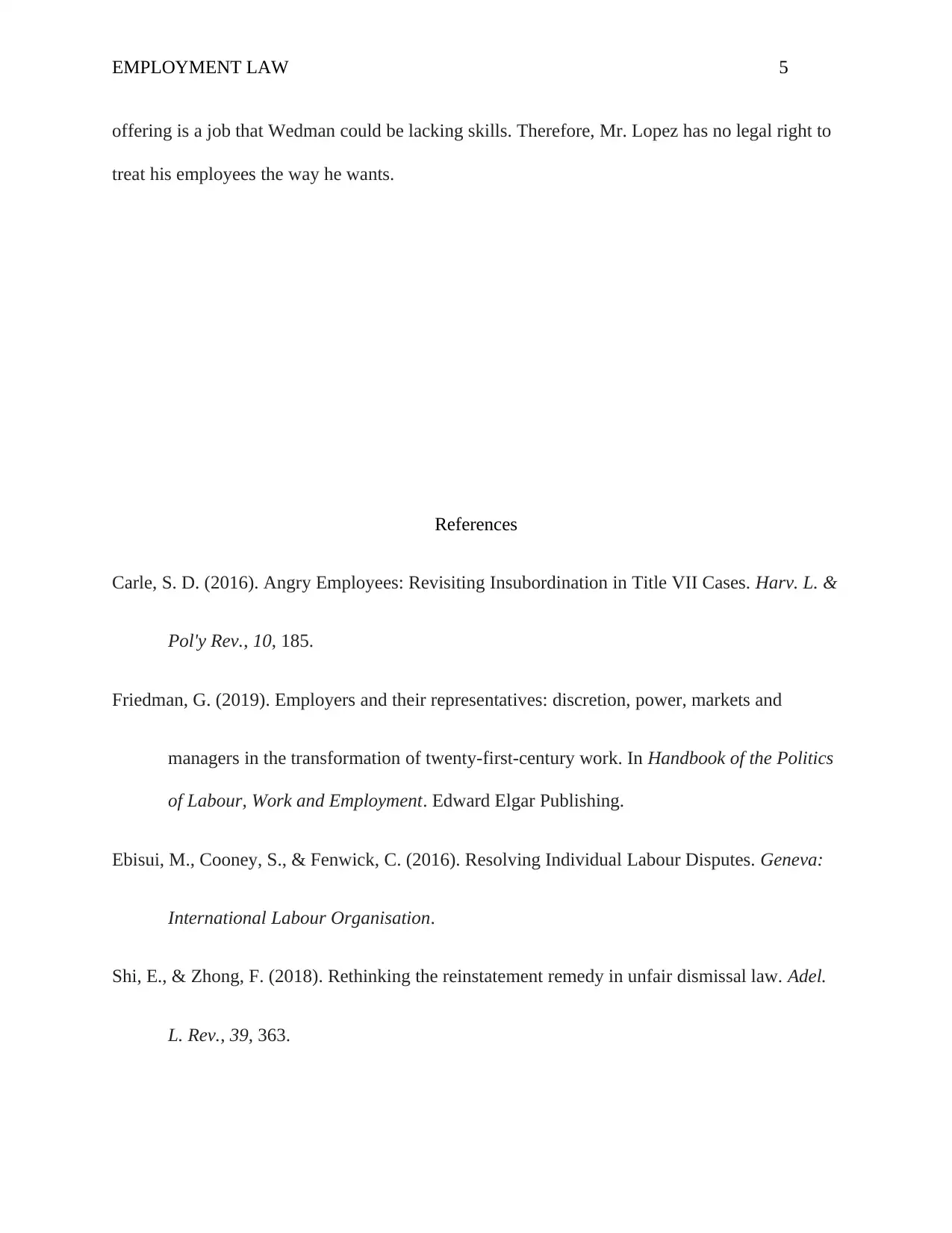
EMPLOYMENT LAW 5
offering is a job that Wedman could be lacking skills. Therefore, Mr. Lopez has no legal right to
treat his employees the way he wants.
References
Carle, S. D. (2016). Angry Employees: Revisiting Insubordination in Title VII Cases. Harv. L. &
Pol'y Rev., 10, 185.
Friedman, G. (2019). Employers and their representatives: discretion, power, markets and
managers in the transformation of twenty-first-century work. In Handbook of the Politics
of Labour, Work and Employment. Edward Elgar Publishing.
Ebisui, M., Cooney, S., & Fenwick, C. (2016). Resolving Individual Labour Disputes. Geneva:
International Labour Organisation.
Shi, E., & Zhong, F. (2018). Rethinking the reinstatement remedy in unfair dismissal law. Adel.
L. Rev., 39, 363.
offering is a job that Wedman could be lacking skills. Therefore, Mr. Lopez has no legal right to
treat his employees the way he wants.
References
Carle, S. D. (2016). Angry Employees: Revisiting Insubordination in Title VII Cases. Harv. L. &
Pol'y Rev., 10, 185.
Friedman, G. (2019). Employers and their representatives: discretion, power, markets and
managers in the transformation of twenty-first-century work. In Handbook of the Politics
of Labour, Work and Employment. Edward Elgar Publishing.
Ebisui, M., Cooney, S., & Fenwick, C. (2016). Resolving Individual Labour Disputes. Geneva:
International Labour Organisation.
Shi, E., & Zhong, F. (2018). Rethinking the reinstatement remedy in unfair dismissal law. Adel.
L. Rev., 39, 363.
1 out of 5
Related Documents
Your All-in-One AI-Powered Toolkit for Academic Success.
+13062052269
info@desklib.com
Available 24*7 on WhatsApp / Email
![[object Object]](/_next/static/media/star-bottom.7253800d.svg)
Unlock your academic potential
Copyright © 2020–2026 A2Z Services. All Rights Reserved. Developed and managed by ZUCOL.





